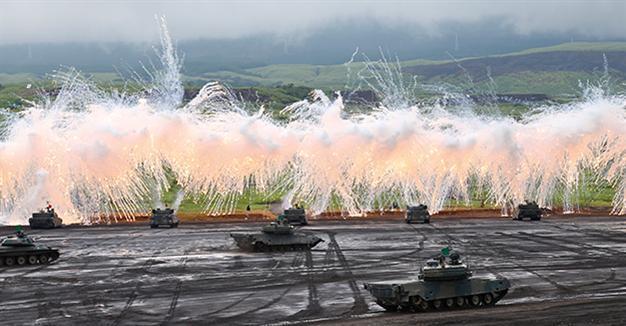PM Abe’s cabinet approves largest defense budget
TOKYO-Agence France-Presse

In this Aug. 18, 2015 file photo, Japan Ground Self-Defense Force's Type-89 armored combat vehicles flare up a smoke screen during an annual live firing exercise at Higashi Fuji range in Gotemba, southwest of Tokyo. AP Photo
Prime Minister Shinzo Abe’s cabinet on Dec. 24 approved Japan’s biggest ever annual defense budget, as the country bolsters its military amid territorial rows and concerns over China’s expanding naval reach.
The cabinet approved 5.05 trillion yen ($41.8 billion) in defense spending for the next fiscal year starting in April, with the focus on strengthening protection of a string of southern islands that stretch from Japan’s mainland to waters near Taiwan.
The allocation is part of a record 96.7 trillion yen national budget that will now be sent to parliament for debate and approval early next year.
The defense budget is 1.5 percent higher than the current fiscal year which was the previous record high, and marks the fourth straight annual increase in defense spending.
The trend reflects a hawkish Abe’s attempt to build a military -- more active and collaborative with its biggest ally, the United States -- with an eye on a possible escalation of tensions with China.
In September, Abe pushed contentious security bills into law, a move that could see Japanese troops fight abroad for the first time in 70 years.
“We expect the latest procurement would contribute further to cooperation between Japan and the United States,” a defense ministry official told reporters.
But the official said the latest military budget, which was requested in August, does not yet reflect the new legislation and the ministry will study if the new laws will require bigger budgets in future years.
Abe is pushing to tweak Japan’s pacifist constitution, a move that has proved deeply unpopular at home and sparked protests by tens of thousands outside parliament this year.
His defense strategy has also provoked unease in China and South Korea, which were victims of Japan’s aggressive colonial and military campaigns through the end of World War II.
Japan is increasingly wary of China, which is seen by several countries in the region as becoming increasingly aggressive in various sovereignty claims, including a dispute over island ownership with Tokyo.
Among the items on the defense ministry’s shopping list are 17 SH-60K naval patrol helicopters, with a combined price tag of 102.6 billion yen.
It also wants three Global Hawk drones, six hi-tech F-35 stealth fighters and four V-22 Osprey, crossover aircraft that have the maneuverability of helicopters and the range of airplanes.
Japan and China have routinely butted heads over the ownership of the Tokyo-controlled Senkaku Islands, which Beijing claims as the Diaoyus. Official Chinese ships and aircraft regularly test Japanese forces.
Beijing is also expanding its military heft and reach, with annual double-digit defense budget increases and its first aircraft carrier entering service.
